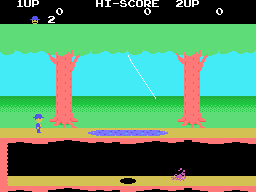|
Pitfall II: Lost Caverns is a platforming video game originally released for the Atari 2600 video game console in 1984. It is the sequel to the popular Pitfall!. Both games were designed and written by David Crane and published by Activision. The star of the games is Pitfall Harry, an 8-bit jungle explorer. The game's plot was later remade loosely into Super Pitfall.
The original Pitfall! has Harry exploring a jungle, collecting treasures, and avoiding danger in the forms of crocodiles, scorpions, cobras, and quicksand. Although the background does not scroll until Harry reaches the edge of the screen, the game was one of the first large platform games for a home video game console.
 |
|
Pitfall II: Lost Caverns - SG-1000 version |
Lost Caverns stays true to the gameplay of the original but greatly expands the scope of the environment, as Harry now descends deep into the catacombs. In addition to the scrolling style of the first, this game adds the element of vertical scrolling, as when Harry falls from a cliff or flies around after grabbing onto a balloon.
While faithful in many respects to its predecessor, Lost Caverns featured numerous changes to make it play differently from the original game. Pitfall Harry has unlimited time and lives, making it impossible to 'lose' the game; when Harry touches a dangerous creature, he simply loses points as he floats back to the last continue point (marked with a red cross) he touched.
Unlike the original Pitfall!, which has a ground level and the underground, Pitfall II has 27 horizontal levels that are predominantly the same height, each being stacked one on top of the other. While these levels span the full eight screens in length, they are not openly accessible all the way across, as some portions are blocked by cave walls that force Harry to travel through other areas in order to progress. Quicksand and tar pits are replaced by rivers and chasms, neither of which is deadly to fall into (though dropping onto a hard surface will cause a loss of points). Balloons allow Harry to ascend to new areas. The game does not have the snakes or crocodiles of the original, but scorpions are still present. New animal hazards include bats, which fly across some screens from left to right; condors, which start by flying right to left, then reverse and fly left to right the remainder of the visit to that screen; Electric eels that swim in the rivers; and frogs that jump over some pits that have ladders, often above where a bat is present.
Two new unplayable characters debut in Lost Caverns: Quickclaw, Harry's cowardly pet mountain lion, and Rhonda, his adventure-seeking niece. Both of these characters also appear with Harry in the Saturday Supercade children's cartoon based on the Pitfall games (in fact, Rhonda and Quickclaw were created for Saturday Supercade a full year before this game was released). Collecting Rhonda, Quickclaw, and a diamond ring is necessary to win the game. In versions without a second cave, upon collection of all three, the game ends on the spot. The maximum possible score is 199,000 (which differs in the Atari 8-bit and 5200 versions, see Adventurer's Edition below).
While Quickclaw is visible on the platform below the starting point of the game, he is inaccessible from this point, and Harry must traverse nearly the entire cave in order to reach him. On the screen to the right is a creature called the 'cave rat'. Harry can drop into the first river through a hole in the third screen. From there, moving one screen to the left brings him to the location of the cave rat. However, the cave rat at this point cannot be passed, and will push Harry back into the water, thereby blocking access to Quickclaw and its own collection. The cave rat can be accessed after reaching Quickclaw by approaching it from behind (on the left side). When it reaches the right side of the screen, it will stop, and its collection will result in 15,000 being added to the score.
Another enhancement over the previous game is the addition of a soundtrack. The musical cues act as subtle rewards and punishments for performance. The main 'heroic' theme plays for a short while before reaching a loop of atmospheric music. When Harry collects a treasure, the main theme begins again. If Harry dies, a slower, minor key version of the theme plays, and then progresses back into the atmospheric theme. Finally, if Harry ascends using the Balloon, Sobre las Olas ('Over the Waves') is played.
Pitfall II: Lost Caverns was one of the largest games ever created for the Atari 2600 and featured elements previously considered impossible on hardware that was already six years old at the time. Smooth scrolling, detailed animation, and a musical score that includes multiple channels were all made possible by custom hardware built inside the game cartridge. Crane designed and patented a component he called the Display Processor Chip (DPC), which could greatly enhance 2600's graphics capabilities and could process music in 3 channels plus drums. Crane hoped that the DPC would be used by other game designers to further extend the life of the aging console, but the video game crash of 1983 made this moot.
More details about this game can be found on
Wikipedia.org.
|
|
2 different online emulators are available for Pitfall II: Lost Caverns. These emulators differ not only in the technology they use to emulate old games, but also in support of various game controllers, multiplayer mode, mobile phone touchscreen, emulation speed, absence or presence of embedded ads and in many other parameters. For
maximum gaming enjoyment, it's important to choose the right emulator, because on each PC and in different Internet browsers, the individual emulators behave differently. The basic
features of each emulator available for this game Pitfall II: Lost Caverns are summarized in the following table:
|